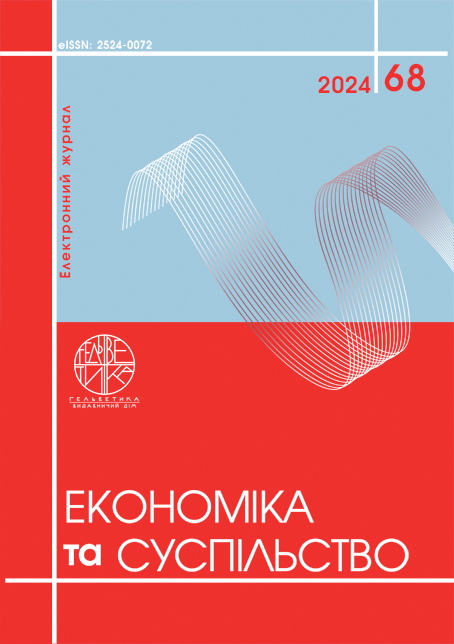ADAPTIVE STRATEGIES OF TERRITORY MARKETING: ATTRACTION OF INVESTMENTS AND TOURIST FLOWS
Abstract
This research examines adaptive marketing strategies for territories as a crucial tool for ensuring sustainable economic development in regions amid globalization and competition. The analysis highlights the significant role that socio-economic factors play in shaping effective marketing strategies. Understanding how various social groups perceive investment opportunities is essential, particularly in regions with higher education levels and social engagement, as these areas typically possess greater potential for attracting investments. Additionally, cultural factors emerge as critical elements in marketing territories, with unique cultural heritage serving as a vital asset for drawing tourists. The research reveals that regions emphasizing their cultural identity often experience increased tourist traffic. Moreover, environmental considerations have become an integral part of contemporary marketing strategies. In the context of climate change and growing societal awareness of environmental issues, regions focusing on sustainable development have a competitive advantage in attracting both investors and tourists. The research also identifies key factors influencing the success of adaptive strategies, such as infrastructure quality, information accessibility, community involvement in decision-making, and marketing communications. The investigation of international best practices can reveal effective approaches to adaptive strategies, particularly in Western European countries, where cross-cultural methods are actively employed in territorial marketing. Engaging local communities in decision-making processes is another essential aspect of adaptive strategies. Research indicates that regions involving local inhabitants in strategy formulation demonstrate superior outcomes. Based on the conducted analysis, the research provides practical recommendations for implementing adaptive strategies, including improving infrastructure quality, establishing platforms for dialogue with local communities, leveraging digital technologies for regional promotion, and developing specialized programs aimed at enhancing cultural tourism. Consideration of socio-economic, cultural, and environmental aspects, alongside active community participation, are crucial for the success of these strategies.
References
Підвальна О.Г. Богуславська С.І. Оцінка економічного впливу індустрії туризму регіону: мультиплікативний ефект. Вчені записки ТНУ імені В. І. Вернадського. Серія: Економіка і управління. 2021. Том 32 (71). № 3. С. 85–89.
Сливенко В. А. Тенденції та проблеми розвитку міжнародного туризму на сучасному етапі. Вісник Дніпропетровського університету. Серія: Світове господарствоі міжнародні економічні відносини. 2014. Вип. 6. С. 80–84.
Laoute C., Bouchra A. Territorial marketing as a tool for territorial attractiveness: literature review. Moroccan Journal of Research in Management and Marketing. 2024. Vol. 16, № 1. DOI: https://doi.org/10.48376/IMIST.PRSM/remarem-v16i1.48814
Sharpley R., Telfer D. Tourism and development: concepts and issues. Clevedon: Channel View Publications. 2014. 568 p. DOI: https://doi.org/10.1108/JTF-09-2017-066
Āzena L., Keišs S. Specifics of territorial marketing strategy planning. European integration studies. 2009. Vol. 3. https://eis.ktu.lt/index.php/EIS/article/view/25738
Разінькова М.Ю. Міжнародний туризм і його вплив на розвиток міжнародної економіки. Інвестиції: практика та досвід. 2020. № 3, С. 32–36.
Antonakakis N., Dragouni M., Eeckels B. The tourism and economic growth enigma: examining anambiguous relationship through multiple prisms. Journal of Travel Research. 2019. Vol. 58 (1), рр. 3–24. DOI: https://doi.org/10.1177/0047287517744671
Pidvalʹna O.H., Bohuslavsʹka S.I. (2021) Otsinka ekonomichnoho vplyvu industriyi turyzmu rehionu: mulʹtyplikatyvnyy efekt. [Assessment of the economic impact of the tourismindustry in the region: the multiplicative effect]. Vcheni zapysky TNU imeni V. I. Vernadsʹkoho. Seriya: Ekonomika i upravlinnya, vol. 32 (71), no. 3, pp. 85–89.
Slyvenko V.A. (2014) Tendentsiyi ta problemy rozvytku mizhnarodnoho turyzmu na suchasnomu etapi [Trends and problems of international tourism development at the current stage]. Visnyk Dnipropetrovs'koho universytetu. Seriia: Svitove hospodarstvo i mizhnarodni ekonomichni vidnosyny, vol. 6, pp. 80–84.
Laoute C., Bouchra A. (2024) Territorial marketing as a tool for territorial attractiveness: literature review. Moroccan Journal of Research in Management and Marketing. Vol. 16, no. 1. DOI: https://doi.org/10.48376/IMIST.PRSM/remarem-v16i1.48814
Sharpley R., Telfer D. (2014) Tourism and development: concepts and issues, Channel View Publications, Clevedon, UK. 568 p. DOI: https://doi.org/10.1108/JTF-09-2017-066
Āzena L., Keišs S. (2009) Specifics of territorial marketing strategy planning. European integration studies. Vol. 3. Available at: https://eis.ktu.lt/index.php/EIS/article/view/25738
Razinkova, M.Yu. (2020) Mizhnarodnyy turyzm i yoho vplyvna rozvytok mizhnarodnoyi ekonomiky [International tourism andits impact on the development of the international economy]. Investments: practice and experience, vol. 3, рр. 32–36.
Antonakakis N., Dragouni M., Eeckels B. (2019) The tourism and economic growth enigma: examining anambiguous relationship through multiple prisms, Journal of Travel Research, vol. 58, pp. 3–24. DOI: https://doi.org/10.1177/0047287517744671

This work is licensed under a Creative Commons Attribution 4.0 International License.


